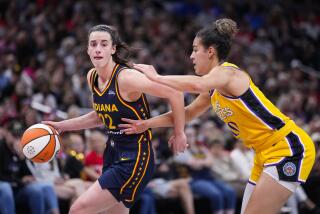Women’s Basketball Is Different, but So What?
- Share via
When the National Basketball Assn. announced last year that it had approved the concept of the Women’s National Basketball Assn., I bristled; it sounded smug and patronizing, a tardy attempt to exploit the escalating fan support of the women’s collegiate game and, later, the women’s hugely popular 1996 Olympic blowout. “Women’s basketball is worthy of your sports entertainment dollars,” was the message I heard from the NBA, “because we say so.”
If the basketball fan in me, the feminist in me, was pleased that “We Got Next,” I had a hard time getting past the idea that it was our turn only because our big brothers decided we could use the court when their season was finished. I like the men’s game. I watch a lot of NBA basketball. But I was primed to reject the WNBA in protest of the NBA’s patriarchal association.
But in late spring, when a sports editor at this newspaper was asked, “When does the WNBA start?” he answered with a sarcastic, “June 21. And it ends June 22.” Lots of people were dismissive and demeaning in assessing the nascent league. They were not prepared to accept the game except as it is played by men. They were not prepared to accept basketball stars except as modeled by men. They were not prepared for a different kind of fan.
So I reconsidered my position. To reject the WNBA for guilt by association with the men was a baby-and-the-bath-water argument, wasn’t it?
Today, I am happily splashing around in that tub. As the WNBA prepares for its first championship playoffs this week, I, a Los Angeles Sparks season ticket holder, am surprised that my enthusiasm isn’t about just basketball. Sure, I’m celebrating that the Sparks almost made the playoffs (it came down to overtime in the last game of the regular season); I’m celebrating a sport well played by superior athletes. But also I’m celebrating that the WNBA refused simply to tag along after big brother.
The NBA, like all big-time sports, is polluted by success. Indulged and out of control, it attracts a corollary type of fan, people for whom winning is all, money measures worth and nothing is more important than sports.
The WNBA, by comparison, is refreshingly unspoiled. Sparks fans, some of whom are women who until now didn’t know a jump shot from a jump rope, are undemanding. Still, they appreciate skilled play.
There are only 80 players in the WNBA, 10 on each of eight teams. They represent nine countries, six continents and more colors than Sherwin Williams. Very few made big money this season (if you call up to $1 million big money, a sum that barely covers an NBA star’s bail); many made only the league’s basic salary of $50,000. I’ve never been to a professional sports event where I make more money than the performers.
The intimacy of the league and the modesty of its wages are notable, but I don’t think they are the reason for the difference in player deportment. Is it hopelessly sexist of me to believe that female athletes are simply better sports?
Haixia Zheng, the Sparks’ towering Chinese center, does not speak English, but she couldn’t be more articulate in the language of fan rapport. She smiles when she’s fouled, she smiles when she shoots, she smiles lumbering off the court when the coach pulls her out of the game. And she’s good, finishing the regular season No. 1 in the league in field goal percentage (.618).”Yeah,” I hear some guys grumbling, “but she doesn’t dunk.” Nope, she doesn’t. No WNBA player dunks. Also, so far, they don’t spit at referees, kick cameramen in the groin, commit felonious assault, flip off fans or get busted for keeping company with illegal drugs. The women don’t dunk, and some guys don’t get that basketball is about more than dunking.
Some guys do. Like the two season ticket holders who sat behind me. They cheered for every good play, no matter which team was responsible, and they liked to analyze every tricky no-look pass, defense-busting head-fake and hard elbow to the solar plexus, and what it said about the quality of competition. These guys were not into women’s basketball; they were into basketball.
That WNBA players hang around after the games to sign autographs; that the Sparks’ cheerleaders were a multicultural, gender-inclusive group of middle-school hip-hop dancers; that the league engages in fund- and consciousness-raising for the National Assn. of Breast Cancer Organizations all bespeak the different attitude I saw at every Sparks game.
You could get two Sparks tickets for $12.50; the same seats at a Lakers game go for $22 each. Lots of kids at Sparks games. Lots of spectators I’m pretty sure never had been to another pro game in this city. And it wasn’t just about money. It was about community.
Sitting near me were an African American man and his 6-year-old son. A power-suited African American heterosexual couple on a date. A lesbian couple. A white, elderly husband and wife. Apart from the standard-issue L.A. celebrities, I saw lots of jocky-looking guys and lots of “gangsta”-looking guys. And little boys as well as little girls wearing Lisa Leslie jerseys.
After games, strangers from disparate neighborhoods struck up convivial conversations in the parking lot. Drivers routinely let other cars into the line at the exits.
There was something wonderfully innocent about the WNBA’s debut season. But I worry that success will corrupt this game, as it has so many other professional sports. I’m a fan. I’m also a cynic.
More to Read
Go beyond the scoreboard
Get the latest on L.A.'s teams in the daily Sports Report newsletter.
You may occasionally receive promotional content from the Los Angeles Times.










